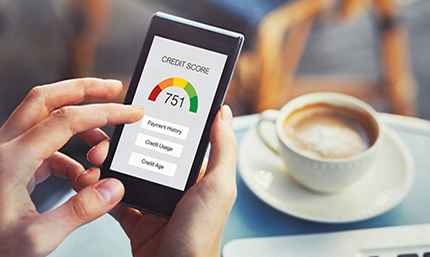News & Tips
How a Good Credit Score Can Impact Purchasing Power

You’re probably well aware of what a credit score is, but what exactly determines your overall credit, and how does it benefit you? Your credit plays a role in your purchasing power in a number of ways. This article will cover credit and purchasing power in depth, as well as how they intersect in crucial ways. Plus, we’ll reveal top tips along the way to improve your financial wellness overall.
What is Consumer Purchasing Power?
At its simplest, consumer purchasing power is the ability for people to buy the goods and services they want and need. The current monetary value and inflation both factor into the measurement of purchasing power.
In general, if your income goes up at the same rate that prices do, your standard of living remains the same. If your income rises more quickly than costs, then your standard of living improves. If the opposite happens, then the standard of living decreases. This illustrates the range of possibilities of someone’s buying power.
Why Purchasing Power Matters
Buying power plays a key role when someone is looking to purchase on credit—whether they plan to apply for a mortgage, a car loan, or a credit card. Said another way, buying power involves someone’s ability to get funding approved for new debt. When they have significant ability to do so, they have high buying power.
If you’ve saved money and prices have gone up due to inflation, then the power of those saved dollars aren’t as strong as they once were. So, if you find yourself saying, “Money just isn’t going as far as it used to,” you’re talking about a reduction in purchasing power. The same concept applies when you look at the balance in retirement accounts or other investments.
What is a Good Credit Score?
A credit score ranges between 300 and 850 with a higher score resulting in a better chance for loan approval, better loan rates, and more. FICO® is a credit score often used by financial institutions when making lending decisions. Factors that go into its calculation are as follows:
- Payment history (35%)
- Amount owed (30%)
- Credit history length (15%)
- Credit mix (10%)
- New credit (10%)
Here’s the breakdown of FICO credit score category ratings:
- Exceptional: 800-850
- Very Good: 740-799
- Good: 670-739
- Fair: 580-669
- Poor: 300-579
Lenders often have their own guidelines, including on the minimum score a borrower needs for loan approval. So, although FICO labels scores between 670-739 as “good,” lenders may use somewhat different numbers to qualify borrowers. In most cases, the better the credit score, the better the interest rate offered.
Looking to Build or Improve Your Credit Score?
Visit our Beginner's Guide to a Good Credit Score (& How to Get One).
How Purchasing Power Improves with Good Credit Scores
When you have excellent credit, it leads to better buying power. Because with quality credit, you’re more likely to get better interest rates on loans, which usually means saving more in the long run.
Plus, you’ll also have a better chance of getting approved for higher loan amounts. Borrowers with poor credit may get approval for a loan with the caveat of higher interest rates.
Additionally, with good credit, you’re more likely to get approved for a lower deposit if you’re renting an apartment as well as lower insurance policy premiums. Both of these benefits mean you’ll be able to save more money for larger purchases and stay on top of loan payments.
Getting a raise or bonus at work or otherwise increasing your income can help with purchasing power, too. After all, more financial resources at hand allow you to buy what you want and need, and it makes it easier to save money for down payments on houses, cars, and the like. When you put down more money up front, you can borrow less and pay less interest over the life of the loan. When you pay less interest, you pocket more savings.
Credit Unions and Financial Wellness
The ultimate goal of good credit, emergency savings accounts, investments, and so forth is to experience financial wellness: to be able to comfortably afford what you need and to enjoy life. Financial wellness is at the heart of credit unions. Unlike banks that focus on profit, credit unions like SCCU make decisions that benefit members. What’s in your best interest as a member, then, is in the best interest of the credit union as a whole.
Credit unions are not-for-profit organizations, typically with the purpose of serving people who work in certain professions, have certain affiliations (such as a teacher’s credit union), or live in defined geographies. If you live or work in any of these counties, you can become an SCCU member simply by opening an account online or at a branch near you.
We offer a variety of resources to help you achieve your financial wellness goals, such as financial calculators, fraud-fighting resources, an auto buying center, a home buying center, financial wellness articles, and an easy-to-use budget worksheet.
As a member of SCCU, you benefit in numerous ways that will help enhance your financial wellness and boost your purchasing power because of the following:
- Interest rates on credit cards and loans are typically lower. If you refinance a car to a lower interest rate, you’ll pay less interest over the life of the loan—again, keeping more of your own money. Plus, if you refinance a car to a more affordable payment, then this can help you make your payments on time—which will help you protect and even strengthen your credit scores.
- Fees are usually lower or nonexistent. For example, when you switch to a Free Checking account and no longer pay fees, more of your hard-earned money remains available for you to spend and save. We also don’t charge application fees.
- Interest rates on savings and investment products are usually higher because credit unions return profits to members in this way.
By becoming a credit union member, you’re supporting your community and changing people’s lives. We also offer exclusive mortgage and auto loan offers and rates for hometown heroes.
Your deposits at SCCU are insured through the National Credit Union Administration (NCUA).
Benefit from the Personal Touch at SCCU
As a credit union that exists to serve our members, we provide you with excellent personalized customer service and exclusive membership benefits. If you live in our Florida service area, we look forward to providing you with great service. If you’d like to talk about the benefits of choosing SCCU or have any questions, feel free to reach out to us.






















































